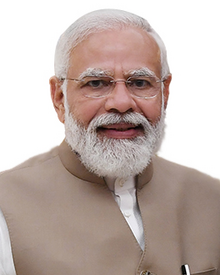- Get link
- Other Apps
- Get link
- Other Apps
Narendra Damodardas Modi, born on September 17, 1950 in Vadnagar, a small town in Gujarat, India, has emerged as a prominent and influential political figure on the global stage. His rise to power and leadership style have left an indelible mark on Indian politics. From humble beginnings to the highest pinnacle of power, Narendra Modi's journey is a testament to determination, resilience and commitment to public service.
Early life and education:
Narendra Modi was born in an ordinary family and his father Damodardas Modi worked as a tea seller. Despite facing financial constraints, Modi showed a keen interest in politics from a young age. He was associated with the Rashtriya Swayamsevak Sangh (RSS), a Hindu nationalist organization, during his early years.
Modi received his education at the University of Delhi, where he completed his bachelor's degree in political science. His involvement in student politics and dedication to the RSS laid the foundation for his future political career.
Rise through the ranks:
Narendra Modi's political career began in the early 1970s when he joined the Bharatiya Janata Party (BJP), the political wing of the RSS. His organizational skills and strategy-making effectiveness earned him instant recognition within the party. Modi played important roles in various states, eventually reaching the post of general secretary of the BJP.
Chief Minister of Gujrat:
A turning point in Narendra Modi's political fortunes came in 2001 when he became the Chief Minister of Gujarat. His tenure in this role was filled with both praise and controversy. Under Modi's leadership, the state witnessed impressive economic growth, infrastructural development and administrative reforms. However, the Chief Minister also faced severe criticism for his handling of the 2002 Gujarat riots, which resulted in communal violence and tragic loss of life.
Despite the criticism, Modi's popularity within the BJP remained intact and he remained a major player in national politics.
Candidacy for the post of Prime Minister:
Narendra Modi's charisma and governance record put him at the forefront of the BJP. In 2014, he became the party's prime ministerial candidate for the general election. His campaign, centered on promises of economic growth and good governance, appealed to Indian voters.
In a historic victory, the BJP won a majority in the Lok Sabha (the lower house of the Parliament of India), and Narendra Modi was sworn in as the 14th Prime Minister of India on 26 May 2014.
Prime Ministership:
Modi's leadership as Prime Minister has been marked by a focus on economic reforms, infrastructure development, and initiatives such as "Make in India," "Swachh Bharat Abhiyan" (Clean India Campaign), and "Digital India." His government implemented the Goods and Services Tax (GST) and demonetization as part of economic policy measures.
Internationally, Narendra Modi has strengthened India's diplomatic relations and played a prominent role in global forums. Their commitment to environmental issues is evident in initiatives such as the International Solar Alliance.
Re-election and second term:
In the 2019 general elections, Narendra Modi won a landslide victory, confirming his popularity among Indian voters. Economic reforms and social welfare programs continued in his second term as Prime Minister.
Legacy and influence:
Narendra Modi's leadership style is characterized by decisiveness, strong governance and focus on development. However, his tenure also drew criticism, especially regarding issues of religious and social harmony.
To the best of my knowledge in January 2022, Narendra Modi remains an important figure in Indian politics, with his influence extending beyond the country's borders. The story surrounding his legacy is diverse, reflecting the complexities of contemporary Indian politics.
Narendra Modi's journey from a small town in Gujarat to the Prime Minister's residence in New Delhi is a remarkable story of ambition, resilience and political acumen. His leadership has shaped India's domestic and international policies, having a lasting impact on the country's progress. Whether viewed through the lens of economic development, social initiatives or challenges, Modi's biography is a revealing narrative in the rich tapestry of Indian political history.

Comments
Post a Comment